Dear prime minister
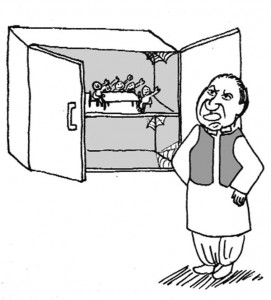
Sir,
The PML-N government had promised that load shedding will be reduced during Ramadan, but the ugly reality is that the power is out 12 hours a day, and there are frequent breakdowns even in DHA Lahore, where the electricity bill recovery is over 90%.
My humble request to Prime Minister Nawaz Sharif is to wake up and stop relying on bureaucracy and look beyond his present kitchen cabinet for saner advice within your own party, because the courtiers that surround you will keep you in the dark.
Remember sir, it is the common man of Pakistan who voted for you, not just the few thousand traders, retailers or members of your clan, whom your government seems to be preoccupied with. These traders were nowhere to be seen when your government was toppled in 1998, or when you tried to come back to Pakistan.
A business friendly government promotes economic recovery by cutting down bureaucratic red tape and keeps check on abuse of discretionary powers, provide law and order, ensure justice, and recover taxes from every citizen who earns above a uniform declared income. No system of governance in world, be it capitalist, socialist, or even Islamic, can survive unless it has a reliable welfare system for most deprived sections of society and for such a system tax collection is mandatory. This is the reason why tax evasion is considered as heinous a crime as murder or rape in civilized countries, irrespective of whether they have a parliamentary system or a presidential system.
Morals and ethics of governance are universal and every religion emphasizes upon them. An elected government derives its moral authority from constitution and laws, and it loses this legitimacy the moment laws become subordinate to whims of individuals. What happened in Model Town could never have happened if saner politicians within your party had a role, instead of bureaucracy and a few elements within your party who think that strongarm tactics can work. Your government must tackle these issues politically in accordance with laws, otherwise you will only help political orphans who are agitating against you.
Ali Malik,
Lahore.
Power politics
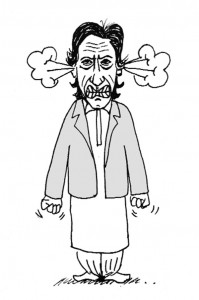
Sir,
Politics of agitation haven’t done any good to this nation before, and they wouldn’t do any good in the future as well. They have, in fact, done more harm than good. Demonstrations and rallies against the government by the political demagogues in the opposition is a phenomenon well known to the people of this country.
Traditionally, the leaders sitting in the opposition have always tried to influence the downtrodden and ignorant people of this country through their firebrand speeches focused on lambasting the government in power, justly or unjustly. However, in the process of doing so, a very important factor that they have always overlooked is the immense damage that it has caused to this nation and this country.
Unfortunately, things have started moving in the same direction yet again. From all that is happening now, one could say with full confidence that we have not learnt from our past mistakes. The people of Pakistan are partly to be blamed for all that has happened in the past and for what is happening now. They are, once again, deliberately or inadvertently playing into the hands of the demagogues who are exploiting them for their personal benefit.
The Chairman Pakistan Tehrik-e-Insaf Mr Imran Khan’s party tops the list of the agitating parties who are ardently engaged in playing with the emotions of the people and are hell bent on ousting the incumbent government of Mr Nawaz Sharif, no matter what it costs. Now, the Pakistan Awami Tehreek chief Mr Tahirul Qadri, the Chaudhry’s of Gujrat, and Mr Sheikh Rashid of the Awami Muslim League have also jumped on the bandwagon. Greed for power is one reason why these political groups have ganged up to create anarchy in the country, but the failure of the government to deliver is another reason.
The lust for power has, in fact, made all of them turn a blind eye to the multifaceted and most intricate predicaments of this country and this nation. The Pakistan People’s Party is the only political party that has lucidly demonstrated its sanity and decided not to join the political forces that have launched a movement to oust the government. The fact of the matter is that the PPP has repeatedly stated that it would not join any movement that would potentially harm democracy in the country. PPP’s stance in the matter couldn’t have been more appropriate particularly when seen in the backdrop of the critical situation that Pakistan is in today.
The Pakistani nation makes a fervent appeal to the agitating political parties, particularly PTI, to stop agitating and creating anarchy in the country forthwith. Because by doing so they might succeed in attaining their personal objectives, to some extent, but the country may have to bear damages of inconceivable magnitude. Pakistan is passing through one of the most critical times in its history. Time has come to bury personal prejudices and interests in larger national interest, and make sincere and concerted efforts to strengthen Pakistan economically, socially and democratically.
M Fazal Elahi,
Islamabad.
Crossroads?
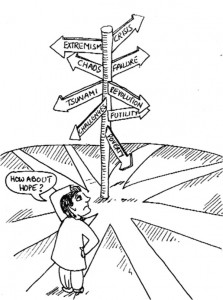
Sir,
Many have called Pakistan a country that is in the “eye of a storm” or is politically “a failed state” – a “country in crisis”, facing mostly the “crisis of governability” and is thus either in a “fruitless search for democracy” or with a “poor track record of democracy”. And having made a “drift into extremism” and being “on the brink” of “chaos” and “crisis”, for many the “Pakistan cauldron” suggests its “stability paradox” that has always depended on the clichés of three A’s: “Allah, Army, and America”, and is now “waiting for Allah” because it is at a “critical juncture” – especially at a “critical juncture in its political history as it undertakes an uncertain journey towards democratization”.
Moreover, many writers, Pakistanis as well as others, especially in post-9/11 era, have authored books on various aspects of Pakistan’s history, especially political, with very “terrifying”, “scary”, “distressing”, and “precarious” titles. Just having a look at these titles, it seems as if Pakistan is going to “perish” from the globe in moments.
Besides all this, the key question Pakistan faces today is whether it will be able to complete the current second consecutive democratic order, or whether it will slip into a “political turmoil” that has characterised most of its history – especially uner Gen Ayub Khan in the 1960s, Gen Ziaul Haq in the 1980s, and Pervez Musharraf in the 2000s. But amid this “chaos” — including threats of “tsunami” and “peaceful revolution”, and of Taliban “blowing up” this and that — and the “challenges” Pakistan is facing, there is hope for the success of democratic governance and of political stability in Pakistan.
What Pakistan is in need of is, in the words of Saeed Qureshi, to “let the present government stay at the helm for the … constitutional period. It would be up to the people to re-elect or reject it in the next elections. That is how the democratic tradition would be firmly rooted and flourish” (Pakistan Today June 21, 2014, & Pakistan Observer, June 25, 2014).
In Pakistan, amid the prevailing “chaos” and the “challenges” Pakistan is facing, there is “hope” for the stability and success of its democratic politics, on the conditions that (i) Pakistan realizes its potential, (ii) opposition parties do not create hindrances in the smooth functioning of the governments-in-power, and (iii) the government focuses on transparency, on combating the challenges it faces, and solving the problems of its citizens.
Let’s hope we come out of this “critical juncture”, “enigma”, and “cauldron” and “hope” it creates a new history—a history full of hope, optimism, progress, and much more.
Tauseef Ahmad Parray,
Islamabad.
Offence is the best defence
Sir,
The times are changing for the better as Pakistan goes through a major political and strategic change in governance. It is a decisive time in the country’s history. Everyone knows that an operation against militants was long overdue, and intelligence agencies had already specified the “silent risk” of letting them operate in sanctuaries in the tribal areas. The approval for the operation was sanctioned several years ago. Politics aside, it is the army’s responsibility not only to protect the country against potential external threats, but also fight the internal existential threats that the country is facing. A failure to act would not have achieved anything. We would still be in the middle of a war that we did not begin. Operation Zarb-e-Azab is a game-changed.
Offense is the best defense, and the new military leadership seems to be following this strategy, and that has made the new army chief popular not just among the soldiers but also among the masses. With a full-fledged tactical war against insurgents, we are finally hitting the home run.
Born in 1956 in Quetta to a family with a prominent military background, the new Chief of Army Staff is from Kunjah in the Gujrat district of Punjab province. His father, Muhammad Sharif, was a retired major. He is the younger brother of Major Shabbir Sharif, who fought in the India-Pakistan war of 1971 and received the Nishan-e-Haider. He is also the nephew of Major Aziz Bhatti, another Nishan-e-Haider recipient, who fought in the 1965 war.
General Raheel is a man of incredible credentials and history. He is well supported by General Tariq. Both men enjoy good chemistry and a formidable combination of academic knowledge and war intelligence. General Tariq’s impeccable record as a war general will be a tremendous support to General Raheel in key areas of Afghanistan and FATA, as the army evaluates the new regional security policy.
Zeeshan Shah,
Karachi.
Every day is Father’s Day
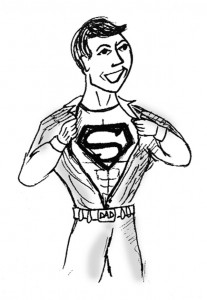
Sir!
This refers to the news reports and photographs showing participants cutting cakes to mark the Father’s Day. The coverage of the events in newspapers left me and many others like me in a state of shock and depression and a feeling of sadness, gloom, heavyheartedness and mournfulness engulfs my whole self, my body and my soul, and left me with a sense of shame. Shame – because we have fixed just one day for a person because of whom we are enjoying our lives, a person who worked day and night, in heavy rains in sizzling and scorching heat for our comfort, who wore torn clothes but provided us with the best possible apparel, who remained hungry but made available the best and healthiest food for us, who never complained about anything, whose only aim in life was the welfare and the best education of his children.
I still remember the day a cold day of December 1994 , when I returned from high seas and saw the empty chair of my father, my dear Abu. In spite of shivering chill I started sweating due to the fear and horror of being left alone in the world. It was panic and terror, as my Abu was no more there to advise me, to counsel me in the time of need. It was a feeling of numbness and withdrawnness, a feeling of aloofness, a feeling of loneliness, as my Abu upon whom I always looked at times of distress, agony and misery, was no more there.
As Sigmund Freud has said, “I cant think of any think of any need in childhood as strong as the need for a father’s protection”. And this need, with every passing day, becomes stronger and stronger. My Abu, so handsome, so honest, so gentle and so highly educated, with a double master’s, LLB and widely read, who was once the tutor of Late King Zahir Shah of Afghanistan for History and English, left that lucrative job just for the sake of his mother, wife and children.
At that time he had only one daughter, the eldest one, who he would take on his bike for a ride, in the front basket, around the roads of Merruit in the undivided India. For him, the whole world was his dear daughter “Bitto”.
Abu was a government servant and had three daughters and three sons, and with his meager wages, he provided them with the best available education and, above all, injected in them the highest standards of morality. Very quietly he made us human beings in the real sense. He induced in us his honesty, truthfulness and veracity, self respect and respect for the others. There are countless attributes which he quietly and calmly induced in our souls, minds and bodies.
He never told us verbally how to live our lives. He himself lived an exemplary life that we just watched and followed.
Such are our fathers. And we are so ungrateful that we have dedicated only one day for him, just one day for a person who sacrificed his whole life for us, who dedicated his entire life just to achieving one goal: to see a smile on the faces of his children.
My Abu would write me letters every day without fail when I was away on the high seas, never complaining and never asking for anything. Just words of love and affection and advice for a clean, spotless and taintless life, quoting from the lives of great people of dignity, honor and of prestige. Whatever I am today is only because of my dear Abu, and I feel that it would be an insult to him if I dedicate just one day to him.
Through these lines I request all your readers to don’t disgrace your fathers by naming only one day after them. Think about your fathers every day, every hour and every moment of your life.
Aamir Aqil,
Lahore.
More democracy
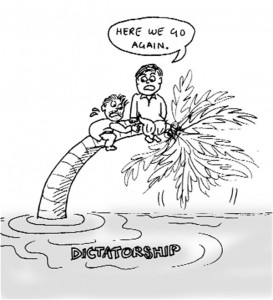
Sir,
People elect a government to deliver to them equal rights, equal opportunities, basic needs such as health, education, clean drinking water, and the right of security of life, property and employment.
There is no rocket science involved in delivering good governance, all that is needed is to restore rule of laws, not of men. Public interest is served only when there is law and order, justice is provided and basic human rights and needs are met.
Other than in Singapore, where an elected civilian dictator with impeccable record of integrity succeeded in developing his country, no nation in world has prospered under military dictatorship. Lee Kuan ensured strong powerful institutions with regulatory controls to build a financially powerful and self reliant city state. Revolutions do not occur through dharnas or cult like leaders who exploit religion, nor by men who live in air-conditioned villas and address their followers sitting in bomb proof vehicles. Tahrir Square-like dharnas don’t bring change, but only a more repressive regime. The only cure for a weak democracy is more democracy, with strong civilian institutions, an independent judiciary and a focus on development of human resources.
It is not the job of army, nor are they trained to govern. Their role is to defend the country against external aggression and come to the aid of the elected civil government when called upon to do so. Our unfortunate experience of over 35 years of extra-constitutional intervention is proof, if any is needed, that they cannot deliver to people the basic necessities of life. Instead every intervention has been followed by increase in terrorism, a widened gap between rich and power and an adverse effect on the army’s basic professional role. Pakistan was not created to replace over 200 years of colonial rule with dicatorship, but for self-rule through elected public representatives answerable only to people, who alone have the right to change the government through the ballot.
Tariq Ali,
Lahore.

